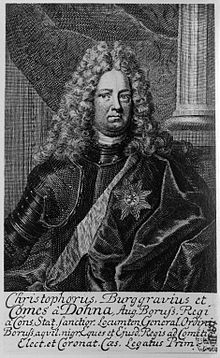Christopher I, Burgrave and Count of Dohna-Schlodien (2 April 1665 – 11 October 1733) was a Prussian general and diplomat.
Christopher I, Burgrave and Count of Dohna-Schlodien | |
|---|---|
 Christopher I, Burgrave and Count of Dohna-Schlodien | |
| Born | 2 April 1665 Coppet, Principality of Orange |
| Died | 11 October 1733 (aged 68) Schlodien, East Prussia |
| Allegiance | |
| Years of service | 1670-1716 |
| Battles / wars | Nine Years' War |
| Awards | Order of the Black Eagle |
Life
editDohna was born at the Coppet Castle in Coppet near Geneva, one of the sons of Frederick of Dohna (1621–1688), Governor of the Principality of Orange, by his marriage to Espérance du Puy Montbrun. He and his brother Alexander were educated privately by Pierre Bayle.
Dohna joined the Prussian Army in 1670 and was promoted Captain in 1680. He fought in Hungary in 1686 in the Great Turkish War and became a Colonel of the Grands Mousquetaires on 20 October 1686. In 1692 he fought in the Nine Years' War against France, rising to command a regiment of infantry and being promoted Major General in 1698. The same year, he was sent on a diplomatic mission to England. In 1704, he came into conflict with Johann Kasimir Kolbe von Wartenberg and lost much of his influence at the Prussian Royal Court, but returned after Kolbe's dismissal. In 1711 Dohna was the Prussian envoy at the election of Charles VI, Holy Roman Emperor, and was promoted General of Infantry by Frederick I of Prussia in 1713. Dohna became the Amtshauptmann of Prussian Holland and took part in the Siege of Stralsund in 1715. He retired on 10 February 1716 and returned to his estates in East Prussia.
Dohna married a cousin, Frede (Frederica) Marie von Dohna (28 December 1660 - 22 November 1729) on 18 November 1690. Their sons William Alexander (1695–1749) and Christopher II were also Prussian generals. Their daughter Ursula Anna von Dohna-Schlodien-Carwinden (31 December 1700 - 17 March 1761) married Frederick William II, the son of Frederick Louis, Duke of Schleswig-Holstein-Sonderburg-Beck.
Dohna was the first to add Schlodien to his name and died at his family estate of Schlodien.
Notes
editRegarding personal names: Graf was a title before 1919, but now is regarded as part of the surname. It is translated as Count. Before the August 1919 abolition of nobility as a legal class, titles preceded the full name when given (Graf Helmuth James von Moltke). Since 1919, these titles, along with any nobiliary prefix (von, zu, etc.), can be used, but are regarded as a dependent part of the surname, and thus come after any given names (Helmuth James Graf von Moltke). Titles and all dependent parts of surnames are ignored in alphabetical sorting. The feminine form is Gräfin.
References
editThis article includes a list of references, related reading, or external links, but its sources remain unclear because it lacks inline citations. (December 2016) |
- Christoph von Dohna: Mémoires originaux sur le regne et la cour de Frédéric I., roi de Prusse, Berlin: Nicolai 1833; German: Die Denkwürdigkeiten des Burggrafen und Grafen zu Dohna. Göttingen: Vandenhoeck und Ruprecht, 1974, ISBN 3-525-35513-0
- Kurt von Priesdorff (Hg.): Soldatisches Führertum. Hanseatische Verl.-Anst., Hamburg [1937], Band 1, p. 59 f.